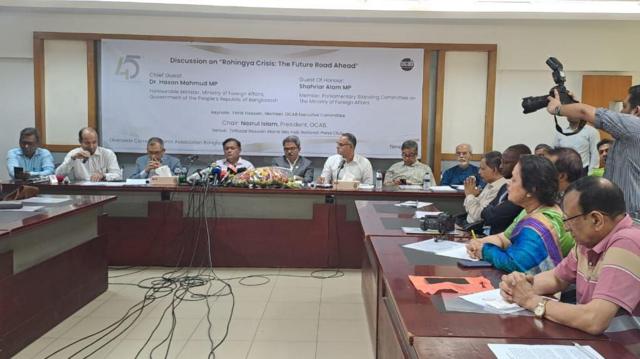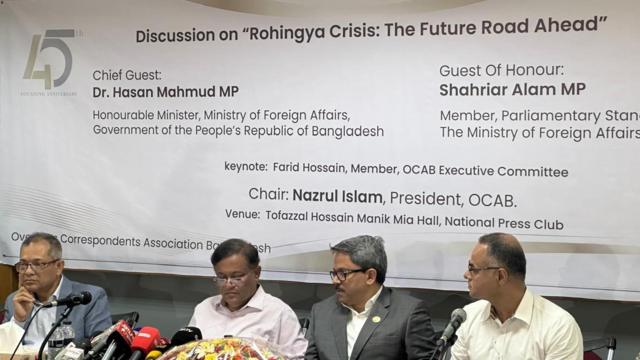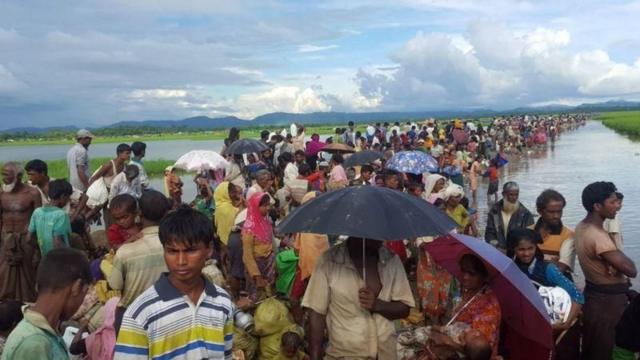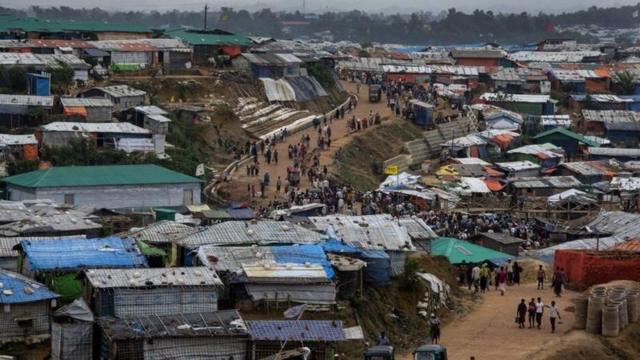Despite many attempts and much discussion for the repatriation of Rohingyas from Bangladesh to Myanmar for the past seven years, practically not a single person has been repatriated. On top of that, Bangladesh experts fear that this repatriation has become more uncertain due to the current internal conflict situation in Myanmar.
Although the foreign minister of Bangladesh is expressing optimism to solve this problem.
Foreign Minister Hasan Mahmud believes that a ‘positive outcome’ will come soon in the case against Myanmar in the international court. He also commented that it will create pressure on Myanmar.
At the same time, he also thinks that a ‘solution is possible’ if two neighboring countries of Myanmar, India and China, are involved in Rohingya repatriation.
However, analysts believe that the country’s internal crisis or ethnic conflict will further hinder Rohingya repatriation.
These views came out in a discussion program of Overseas Correspondent of Bangladesh (OCAB) at the press club in Dhaka on Sunday.
Okab is an organization of international media journalists working in Bangladesh.
The question raised in the event is how far is the process of repatriation of the Rohingya people even after seven years? What is the government’s initiative to reduce the international financial support available for their maintenance?
International relations analysts working on the Rohingya say the crisis is unlike any other.
Analysts urged the government to be more focused on the repatriation of Rohingyas.

‘Proper and Safe Repatriation’
In the main article of the seminar, Farid Hossain, the editor of Bangladesh news agency UNB, expressed concern and said that the discussion about the repatriation of the Rohingyas has decreased a lot. As a result, the process of sending them back has become uncertain in the near future, he expressed fear.
Mr. Hossain said, “The number of Rohingyas in the country is about ten million. As part of Bangladesh’s diplomatic efforts, various countries have negotiated with Myanmar to try to repatriate them, but so far not a single Rohingya has been repatriated.”
However, Bangladesh Foreign Minister Hasan Mahmud says that the Rohingya repatriation process is ongoing. He said that Bangladesh is moving forward in both diplomatic and legal processes.
He said, “The process of repatriation of Rohingyas is still going on. The negotiation process is still going on in this regard. Although the repatriation process was supposed to start last year, the internal situation in Myanmar became fragile.”
“We are following the diplomatic path to solve this problem. At the same time I went to the international court. Case filed through Gambia. As much as the outcome in the international court has come in our favor”, said Mr. Mahmud.

Image caption,Okab’s seminar on Rohingya repatriation was held at the press club in Dhaka
He said that the verdict in this case so far is in favor of Bangladesh.
“There will be a positive outcome of this case very soon. Through the international court, a pressure will fall on Myanmar”, he also expressed hope. Mahmud.
Mr. Mahmud.
“Our regional powers are very important. Here the role of India and China is very important. If we can engage them more, I believe it is possible to solve this problem”.
A bilateral meeting with the Foreign Minister of Myanmar in Uganda Mr. Mahmud said, “They want to at least start the repatriation of Rohingya to avoid international criticism.” That’s what I thought of his words.”
“But the current situation in Myanmar’s Rakhine … their security forces are fleeing to Bangladesh. We cannot push the Rohingyas there in this situation where their security forces are fleeing here.”
However, the repatriation of the Rohingyas is the only solution to this problem, Mr. Mahmud. But according to him it should be a ‘proper and safe repatriation’.
But some western countries are taking Rohingyas to their countries. As a result, those who are still in Myanmar are also fleeing to Bangladesh and taking refuge in developed countries, said Mr. Mahmud.
“Out of 13 million Rohingyas, only a few hundred Rohingyas have been taken to Canada, UK. They are not taking everyone”, said Mr. Mahmud.
If the international pressure continues and if the judgment of the international court is in favor, Mr. expressed hope that Myanmar will be able to start repatriation. Mahmud.
“There has always been ethnic conflict within Myanmar. Therefore, this ethnic conflict should not be used as an excuse to initiate Rohingya repatriation. The process needs to start only when the situation calms down a bit”, said Mr. Mahmud.

IMAGE SOURCE,GETTY IMAGES
What Security Analysts Say
Although the government has talked about the possibility, some analysts do not see any possibility of repatriation in the next two years.
They say, some city or the other in Myanmar is occupied by rebels every day. Members of the military are fleeing and coming to Bangladesh. As a result, repatriation is not possible in such a situation.
Security analyst Brigadier General (retd) Sakhawat Hossain told BBC Bangla, “I don’t see any possibility of repatriation in two years in the current situation. A little while ago, I read in the news that Buthidong, a very strong base of the Rohingyas, has fallen. It was a suburb of Maungdoo, very secure.”
“Making buthidong fruit means then maungdu fruit. The maximum number of Rohingyas who came to Bangladesh were in these places. If Buthidong or Mangdu falls at any time, with whom will you discuss?”, asked Mr. Hussain.
Mr. According to Hussain, every day actually one city after another is falling in Myanmar.
“From Rakhine State, Chin State to Shan – everywhere small towns and cities are falling every day. So I don’t see any possibility. Civil war has started not only in one city but all over Myanmar. As a result, if you think about it, it will not happen, it will end in the next year. Because the war has not yet started,” said Mr. Hussain.
“Once again Arakan pitted the Rohingya against the army. They are also trying to stay in Buthidong, Rathidong, Maungdu. To stay there, they have to show strength to the Arakan Army. I am getting reports that it is doing that.”
As a result, Mr. Hussain.
International relations analysts, however, say that any small diplomatic effort to resolve the crisis cannot be underestimated. Multifaceted diplomatic efforts are essential in this regard.
In the seminar, Professor Delwar Hossain of International Relations Department of Dhaka University said, “The military junta has no control over the internal war situation of the country. Geopolitical instability has now become a reality in the repatriation of Rohingyas in Cox’s Bazar. So any kind of diplomatic process should continue.”

IMAGE SOURCE,GETTY IMAGES
The foreign minister hopes that financial assistance will increase
Foreign Minister Hasan Mahmud said that financial assistance from the international community for the Rohingyas has decreased dramatically in recent years, but it is increasing again from this year.
Mr. Mahmud said, “Last year the funding was completely reduced. Earlier there was an allocation of $12 per head for a Rohingya. But it dropped to just eight dollars. But from this year it has started to increase again. It’s over ten dollars now, it could be eleven dollars.”
“Getting the funding right is also a big challenge. Because the world focus shifted after Russia-Ukraine war, Gaza war. ‘Until 21 the focus was on the Rohingya crisis.’
“But that’s not the case anymore. Because of that, the funding was drastically reduced. However, this year the funding has increased to ten dollars due to many efforts by the government. Every year 35 thousand children are born in Rohingya camps. As a result, funding is very important”, said Mr. Mahmud.
The ‘Joint Response Plan’ or JRP was inaugurated in March this year to solve this problem under the leadership of the Bangladesh government.
Through this, the United Nations and the international community are called to increase financial support for the Rohingya.
Through this JRP, 852.4 million dollars are requested for the 13 lakh Rohingya population in Ukhia, Teknaf and Bhasanchar in Cox’s Bazar.
JRP brings together 117 organizations including various UN agencies, Bangladeshi and international organizations. Every year Bangladesh spends 1.22 billion dollars on Rohingyas.